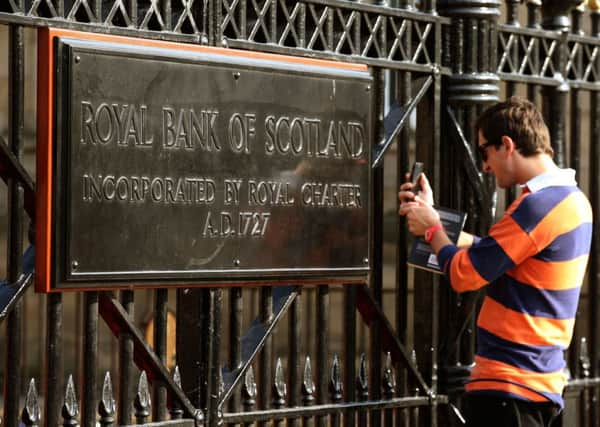Euan McColm: Yes camp know brass plaques matter


More than 35,000 Scots are directly employed by the Royal Bank of Scotland, Lloyds, Tesco Bank, the TSB and the Clydesdale. And yet more – thousands of IT workers in Edinburgh, for example – make their livelihoods working on a contract-by-contract basis.
Surely a collective decision by these big employers to move south of the Border should Scotland choose to break from the UK would be devastating?
Apparently not. Alex Salmond says everything will be fine.
Advertisement
Hide AdAdvertisement
Hide AdDuring a remarkable (and not at all in a good way) press conference on Thursday, the First Minister said this was simply a matter of “moving brass plaques” and jobs would be safe.
Not only this (and here’s the remarkable part), to cheers from Yes Scotland campaigners planted in the press conference, he made a brazen attempt to shut down discussion by turning his guns on the BBC. How, he wanted to know, had the BBC known in advance that RBS was to make its statement about a potential move? Would the BBC, he asked the corporation’s political editor Nick Robinson, co-operate with a clearly necessary inquiry into how this had leaked?
Of course, the faithful peppered among the journalists, couldn’t get enough of this.
When the First Minister sneered about the “metropolitan media”, true believers lapped it up like a chilled Irn-Bru on a hot afternoon’s door-knocking in Buckhaven.
To further support his position, Salmond read from a letter to employees from RBS chief executive Ross McEwan in which he said he didn’t expect a move to England to have any impact on everyday banking services. Furthermore, McEwan said the contingency plan did not represent an intention to move operations or jobs.
Surely this was enough to settle any fears?
Well, I don’t want to come over all Lieutenant Columbo, but there’s just one thing. Why, if the RBS plan was so very inconsequential, did the First Minister try to turn it into a scandal about dodgy dealings within the Treasury? Why did he write to the Cabinet Secretary Sir Jeremy Heywood demanding a full investigation (a request immediately rebuffed on the basis that the RBS position was already known and, therefore, not leaked) if the bank’s announcement was scarcely worth thinking about?
The First Minister did these things because, in fact, banks moving, en masse, south of the Border would have huge repercussions.
But don’t take my word for it. Before Salmond decided it didn’t matter whether banks were based in Scotland, his deputy, Nicola Sturgeon, said that the retention of Scottish corporate headquarters was fundamental to our national economy.
Advertisement
Hide AdAdvertisement
Hide AdSalmond, himself, had a strong belief in the importance of successful banks being based north of the Border. That’s why he wrote to Fred Goodwin, the now disgraced former head of RBS, back in 2007 offering assistance with the bank’s expansion plans on the grounds that they were in Scotland’s interests.
McEwan’s reassuring note about jobs is worth looking at more closely. On the face of it, it’s cut and dried: jobs will be safe.
Yet even within the Yes Scotland campaign there is a lack of confidence about that. Sensible Yes campaigners quite correctly ask how, in reality, banks might move to what would become a foreign country and continue to employ head office staff in Scotland.
Given that these companies would be UK-based, paying tax in the UK, there’s an acceptance that, in time, back-room staff would end up in London rather than Edinburgh.
There is another significant issue which senior Yes campaigners recognise, and it has parallels with the political problems surrounding Salmond’s insistence that there would be a currency union with the remaining UK in the event of a Yes vote.
While the First Minister’s arguments in favour of that idea have focused on what he says is the common sense of the matter (with an added drop of “they’re bluffing” in response to a firm No from his unionist opponents), he has completely avoided the politics. Salmond chooses not to address what must surely be the blindingly obvious fact that it would be a futile task to try convince voters in the rest of the UK to agree that their central bank should put its might behind the financial system of a foreign country that has just decided to break away.
Likewise, it is hard to imagine that UK taxpayers would be happy that their central bank was supporting companies which employ most of their staff in a foreign country. Be under no illusion: Yes strategists are fully aware that that is not even close to being a goer.
With polls showing the No campaign only a whisker ahead in this constitutional battle, the First Minister can ill afford to get bogged down in worries about jobs but his “answers” so far have been heavy on everything-will-be-fine bravado and light on detail.
Advertisement
Hide AdAdvertisement
Hide AdAlex Salmond’s shrug-it-off approach to the news that banks are preparing to leave was a necessary response. He could hardly have reacted any other way.
But his confident pronouncements hide genuine concern among senior Yes campaigners that victory on Thursday would see banking jobs begin to flow south before the celebrations are over. «
Twitter: @euanmccolm
SEE ALSO